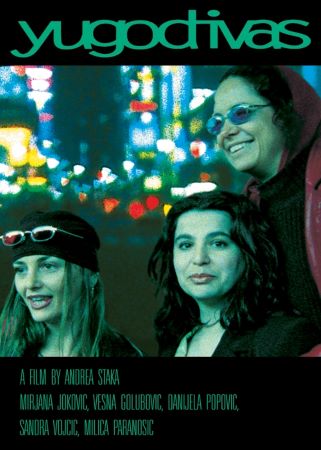
Yugodivas 2000
Distributed by Film Movement
Produced by Dschoint Ventschr Filmproduktion
Directed by Andrea Staka
Streaming, 58 mins
College - General Adult
Acting; Art; European History; Music; Yugoslavia
Date Entered: 10/13/2022
Reviewed by Michael Pasqualoni, Librarian for Public Communications, Syracuse University LibrariesWith streaming video access now widely available to libraries, colleges and universities and other educational institutions, the year 2000 documentary, Yugodivas, has been favored with a 2020 remastering. This relatively brief documentary film directed by Andrea Staka is highly recommended as an insightful portrait of the lives, reflections, and fierce creativity of five transplanted women who left behind the Yugoslavia of their youth for New York City. One has a fascinating contrast here between introspection and artistic expression.
Milica (composer), and Sandra and Dani (pianists) comprise the musical trio known as D’Divas, and we meet them together with actress Mira and painter and graffiti artist Vesna (called “Golub”), who has been in New York the longest, moving west long before Yugoslavia slid into the civil war that would tear it into separate republics. The five arrive in the U.S. at different moments, in some cases creating a karmic bond when first meeting each other at an airport during their move away from Yugoslavia, or in other instances, agreeing to collaborate when meeting during musical training at Julliard. The filmmaker presents audiences with a view of that war torn nation and its people departing from the drumbeats of news media reporting about warfare’s savagery, supplanting this with the beats of artistry one sees the women create.
A work of confessional cinema, Yugodivas offers these friends in conversation, with good questions asked on whether what occurred in the former Yugoslavia can ever be explained, which is then juxtaposed with a superbly rendered look into the creative work of the women at the center of the film. We sit with them. Staka lets us inhabit those sounds and images instead of explaining them. It is a patient film. She also shows us one of the better views of the externalities of creation and destruction for a highly lived in New York City. No iconic sweep of majestic skyline shots here. This is the city, any city, as year-round residents experience it as a home. And for the home for which all these women are at a distance, without manipulation nor gratuitous images of war, the director lets the viewer ponder for themselves how modernity can deliver to us such opposing inclinations in human beings.
The core of the film alongside being a valuable glimpse of immigrant life, is also a lament, as each woman, alone and all of them together, reflect upon what has been left behind in the former Yugoslavia, survivor guilt and universal principles linked to how one comes to terms with any past. Conversational segments of this film resemble a healing circle in a movie frequently meant to be felt and not factually analyzed. As one of the women remarks, “When we talk, we exchange emotions not definitions.” The drive to not be imprisoned by one’s past is highly relatable, such as when Golub prays she never reach her 80s by walking the streets of New York longing to be back in her homeland.
Despite the trauma of war and separation from a homeland that is a through-line as the women have conversations about their individual experiences with difficult situations in their home country, their accomplishment as artists testifies to how art transcends borders. For example, before all became fast friends, some were aware of notoriety associated with the music of D’Divas, and for others a first encounter with Mira is seeing her appear in a role within Serbian film director, Emir Kusterica’s 1995 Cannes Film Festival favorite, Underground.
The hazy origins of beauty are explored when such obviously gifted artists discuss a self-perception uttered more than once that they may be cowards at heart in comparison to fellow citizens who hunkered down and confronted the horrors of war. Without being analytical, the presentation of these feelings of failure, and shrinking from conflict, sits within the film side by side with compelling sequences in Yugodivas where the talents on display within performance and rehearsal are infectious and undeniably impressive results of what has come before. In Yugodivas, the visual art and music speaks for itself with conversational sequences that may strike some as an excess of minimalism. Much is assumed. The women are not with us to present lectures on origins of international conflict nor even exposition about conflicts in their lives. They discuss and share emotional externalities as one would with a good friend. For this realism, these choices made by writer and director Andrea Staka deserve high praise.
Awards:Swiss Film Prize, Best Documentary Nominee; Locarno International Film Festival, Official Selection; DOK.fest Munchen, Official Selection; Belgrade Film Festival, Official Selection
Published and licensed under the Creative Commons Attribution 4.0 license. Anyone can use these reviews, so long as they comply with the terms of the license.